Bodufenvalhgey
Seedi ge Sitti
(Majid's
Mother)
|
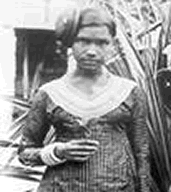 born 28 September
1911 and died 15 August 1991
born 28 September
1911 and died 15 August 1991 |
|
Bodufenvalhgey
Seedi ge Sitti
(Majid's
Mother in the everyday wear of Maldive princesses)
and Maandoogey Tuttudon Goma (aged
9 in the everyday wear of royal female children. The upper body
is covered by a garment called the "kalhu rumaakolhu")
1924.
|
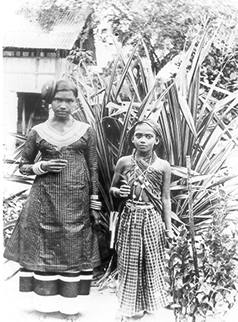 |
|
Maandoogey
Tuttudon Goma
(Majid's paternal aunt in the everyday wear of Maldive princesses
circa 1931)
|
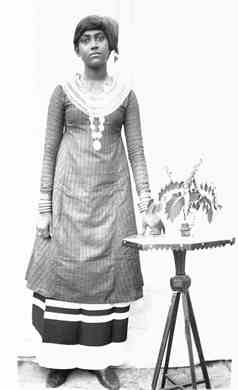
born 1915
died 11 March 2008
|
|
Maandoogey
Tuttudon Goma
(Majid's
paternal aunt in the everyday wear of Maldive princesses circa
1931)
|
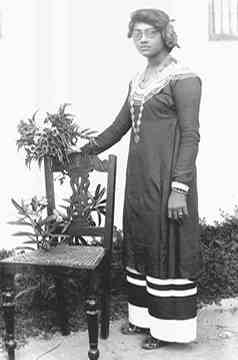 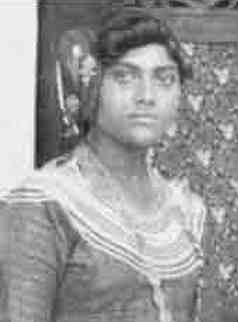
born 1915 died
11 March 2008 |
Uthuru
Ganduvaru Tuttu Goma
(Majid's
paternal aunt in the everyday wear of Maldive princesses circa
1920. This lady was such a radical that she was capable of
virtually anything)
|
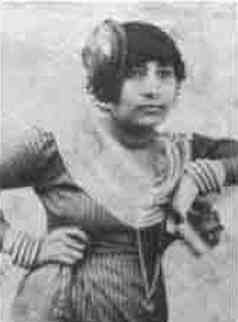
born 1903 -
died circa 1940 |
| |
In
the 1920's the Indian merchants who dominated retail trade
in Malé imported a shipment of children's dolls for
sale. The mullah's became upset and persuaded the authorities
to ban this.
In
the Maldive language, budhu, which is the term for
doll is the same as that for statue, idol and the Buddha.
The word must have been derived from Buddha. At that
stage any graphic representation of any life form, even on
paper was also budhu. That was why the photographs
that my grandfather took and shown here on this page were
highly illegal in the Maldives at that time.
The
mullahs argued that handling photographs and dolls amounted
to idolatory and resulted in apostasy.
My
aunt Uthuru Ganduvaru Tuttu Goma decided to play a prank over
the banning of the dolls.
She
invited the Acting Prime Minister and First Minister of the
Exchequer Athireegey Abdul Majeed Didi for afternoon tea at
her residence. Abdul Majeed Didi, evidently, had long harboured
a hopeless crush on my aunt (pictured above), who was stunningly
attractive.
In
the meantime my aunt had acquired a large quantity of the
contraband dolls from a friendly Indian merchant. When the
horny courtier turned up for his tea he found the reception
room decorated with all manner of children's dolls.
Apparently
he had his tea, but said very little and took his leave in
a hurry.
|
|
Maandoogey
Don Goma
(Majid's
paternal aunt in everyday wear circa 1925)
|
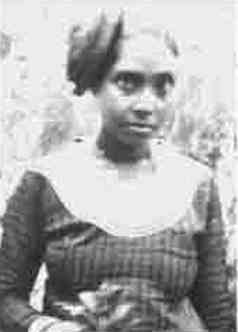
born 1900 -
died 1924 |
|
Maandoogey
Tuttu Goma
(Majid's
paretnal aunt in everyday wear circa 1925)
|
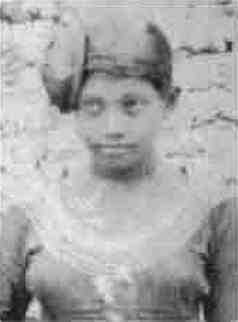
born 1910 - died 1925 |
Uthuru
Ganduvaru Dorhy Goma
(Majid's
paretnal aunt in the costume of India. Both my father's half
sisters and his half brother were absolute legends for challenging
convention. Their half siblings were rather conventional)
|
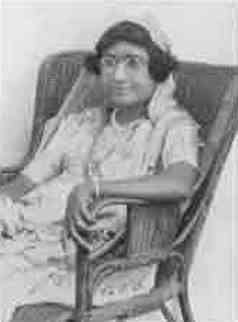
borm 1898 -
died circa 1930 |
Mohamed
Maandoogey Manippulu (also known as Abdul Wahhab Manippulu)
(Majid's
father)
|
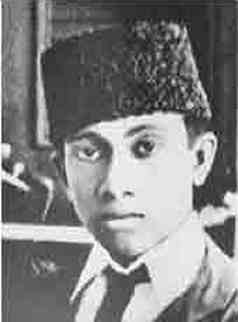
born 16 December
1907 - died 6 October 1999 |
Uthuru
Ganduvaru Manippulu
(Majid's
paternal uncle, just being himself. He was such a free thinker
that he did not survive in the Maldives for any extended length
of time)
|
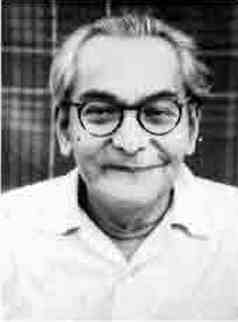
born 1904 - died 1965 |
| |
Uthuru
Ganduvaru Manippulu's sense of humour was legendary and is
worth exemplifying:
-
A
clerk at the Maldive Embassy in Colombo walked into the
ambassador's office one day and found the ambassador absent.
Instead he found Uthuru Ganduvaru Manippulu seated in the
ambassador's seat scribling on a sheet of paper. The startled
clerk reminded the grinning Manippulu very politely:
"Prince, didn't you see the sign outside the office?
It says 'no admittance to the ambassador's office' (in Maldivian
this translates to safeeru-ofeehah vanun manaa).
Manippulu confidently replied, "I read that and clearly
understood what it meant. It has nothing to do with me.
It is a message to the ambassador".
The notice, if read with the a clear pause between safeeru
and ofeehah translates as "the ambassador is
not permitted in office". Bewildered diplomats had
the sign changed very quickly to read huddha nethi vanun
manaa- "no unauthorised admittance".
- During
an extended stay in Malé, one of his servants by the
name of Kuramathy Yoosuf Fulu failed to report to work for
days on end. Yoosuf Fulu lived at his own house. My uncle
sent for him and when he arrived asked him why he had not
turned up for work.
Yoosuf Fulu stood there staring at his own toes for sometime
and replied: "your ideas on philosophy and the like are
starting to make a lot of sense to me. I don't like giving
up my ancestors' ways. So rather than starting to question
things myself, I would like to be left alone in my house".
- Uthuru
Ganduvaru Manippulu stayed just a bit too long in the Maldives
once and got himself exiled to a remote island. Upon his return,
someone asked him how things were there. He replied: "it
was a peaceful place but there wasn't too much to do there.
"So I made friends with the kateeb (headman) and
the mudimu (prayer leader). They insisted that I went
to the mosque 5 times a day. Well, there was nothing to lose,
so I followed them there. After a few days, I started realising
that I was getting better than the old mudimu at this
ritual. That was a bit of a worry, but continued going to
the mosque. Back in Malé I now feel that I'm still
better than the mudimu at that. Now that is more than
a bit of a worry"
- On
a rare visit to Male he found several new additions to the
family. Among them was my brother's son Malik, then aged about
10. He called Malik to his side and said "you have a
very useful name for me. Malik is supposed to be the
keeper of hell. On the day of judgement you will find me in
hell. You'll do me a favour, won't you, and hurl me out with
one of your pit-forks."
|
|
|
Back
|



